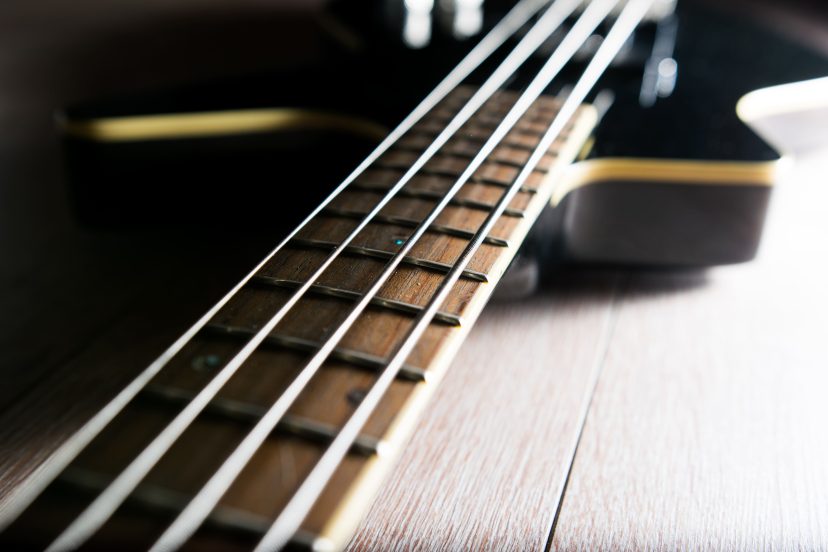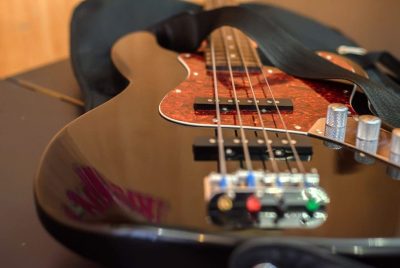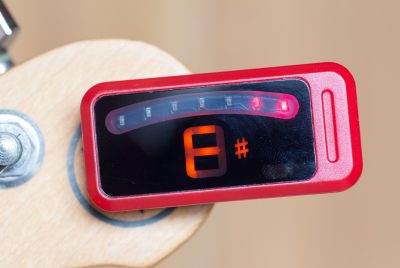Best Bass Guitar Strings: We Recommend the Top Brands
When it comes to achieving the perfect sound on your bass guitar, one key element often overlooked is the choice of strings. Bass guitar strings play a pivotal role in shaping your tone, playability, and overall musical experience. Whether you’re a seasoned professional or an enthusiastic beginner, selecting the right set of strings can enhance your instrument’s performance and elevate your playing to new heights. With countless options on the market, it can be overwhelming to determine which brands and types are truly the best. In this article, we delve into the top brands of bass guitar strings, providing you with recommendations that cater to various styles, preferences, and budgets. Let’s explore the world of bass guitar strings and find the perfect fit for your musical journey.

Best Flatwounds for Smallest Hands
La Bella 760FS-XL Deep Bass Guitar Strings
La Bella 760FS-XL Deep Talkin’ Stainless Steel Flat Wound Bass Guitar Strings are the perfect choice for bassists seeking a rich, smooth sound with exceptional durability. These strings feature a standard gauge of 45-105, making them suitable for a variety of playing styles and genres. Musicians have praised the flat wound construction for its ability to minimize finger noise while providing a warm, full tone that can enhance any performance.
With an extra-long scale designed specifically for extended bass guitars, the La Bella 760FS-XL strings deliver reliability and clarity that players can depend on. Numerous reviews highlight their longevity, as these stainless steel strings resist corrosion and maintain their timbre over time. For anyone looking to elevate their bass sound, investing in La Bella’s Deep Talkin’ series is a decision that pays off with every strum.
Excellent for a 34-inch scale or longer
Recommended by Invaders of the Hear
XL length options available-effective for extended scale basses
Great for vintage tones
Built for extra-long scale basses
Some basses may not accommodate the extra-long scale length
Flatwounds don’t pop like roundwounds
Gauge of string: Standard
Weight: 3.94 ounces
Color: Silver
Weight of set: 45-105
String Type: Stainless Steel
Design: Hand-polished

The best 5-string bass strings
D’Addario Nickel Bass Strings
D’Addario’s XL Nickel Bass Strings (EXL170-5) are a standout choice for bass guitarists seeking superior performance and resonance. Engineered specifically for 5-string bass guitars, these strings offer a gauge of 45-130 that strikes a perfect balance between playability and tonal richness. Players will appreciate the exceptional intonation and durability these strings provide—qualities that enable musicians to express their creativity without being hindered by frequent changes or tuning issues.
In addition to their impressive sound quality, the feel of the EXL170-5 strings is smooth and responsive, making them a joy to play for extended sessions. Whether you’re a seasoned professional or an aspiring bassist, these D’Addario bass strings are designed to meet the demands of a variety of musical styles, promising reliability without sacrificing tone. Overall, the XL Nickel Bass Strings are a must-try for anyone looking to enhance their bass performance while enjoying the assurance of long-lasting durability.
Long-lasting
String lasts long
Best-selling bass strings
Offers a bright, percussive sound
Long scale length is designed for 34″ scale basses and larger
Not the brightest-sounding strings
Not as bright as some bass strings
Weight: 0.5 ounces
Color: 5 String Light
Gauge: Medium
Material Type: Nickel Steel
Number of Strings: 5
Size: 5.8 x 5.6 x 0.8 inches

Best flatwound bass strings
D’Addario Bass Guitar Strings
The D’Addario XL Chromes Flat Wound Bass Guitar Strings – ECB81 in the Long Scale, Regular Light gauge (45-100) stand out as an exceptional choice for any bassist seeking a smooth, versatile sound. These strings are expertly crafted to deliver a warm and velvety tone that enhances the natural richness of the instrument, making them suitable for a variety of musical styles from jazz to rock. Musicians have praised their ability to reduce finger noise, allowing for clean, articulate playing that maintains clarity in both slapping and fingerstyle techniques.
Durability is another highlight of the D’Addario XL Chromes, with their flat wound design ensuring longer playability and resistance to wear. This makes them an ideal option for those who perform regularly or enjoy longer jam sessions. Players have noted that these strings stay in tune well and are surprisingly comfortable to play, making them a favorite among professionals and hobbyists alike. In summary, for anyone looking to elevate their tone and enjoy a premium playing experience, the D’Addario XL Chromes are a solid investment that won’t disappoint.
Mellow, dark tone
Long scale length, so it will work for 34” or 35” scale basses
Perfect for vintage instruments
Warm, rich tone that excels in jazz and blues
Great for fretless basses
Heavy for some players
Can be hard to play
Tone: Mellow
Smoothness: Unparalleled
Package: 4 strings
String type: Flattened ribbon wrap
Brand: D’Addario
Gauge: Medium

Best 5-string bass strings for rock
Rotosound Swing Bass String
The Rotosound RS665LD Swing Bass 66 Stainless Steel Roundwound Long Scale 5-String Bass String is a standout choice for bassists seeking a perfect blend of tone and playability. Renowned for their exceptional durability and dynamic sound, these strings are crafted from high-quality stainless steel, providing a bright, punchy tone that enhances every note played. Musicians have lauded their smooth feel and remarkable responsiveness, making it easy to achieve both complex riffs and subtle nuances.
Additionally, the long scale length ensures compatibility with a variety of bass models, adding to their versatility. Many players have highlighted the Rotosound strings’ impressive longevity, maintaining their tone and integrity even after extensive use. Overall, the RS665LD Swing Bass strings from Rotosound are a reliable option for anyone looking to elevate their sound and performance on stage or in the studio.
Comes pre-coiled in package, eliminating need for taking out car loan to buy them and have them installed
Used by many famous bassists
Well-balanced tone
Stainless steel construction
Balanced tone
Can be too bright for some
Can be a little too bright for some basses
Design: Metallic
Material: Stainless Steel
Type of strings: Medium bass guitar
Recommended for: Electric bass
Weight: 3.52 ounces
Introduced: 1962
What Are the Best Bass Guitar Strings?
Choosing the best bass guitar strings can significantly enhance your playing experience and sound quality. For many bass players, the selection often comes down to personal preference, playing style, and the tonal qualities they seek. Whether you are a seasoned musician or just starting, understanding the various options available in the market can help you find the perfect set of bass guitar strings that complement your instrument and playing style.
One of the most popular types of bass guitar strings is nickel-plated round wounds. These strings provide a balanced tone that combines warmth and clarity, making them an excellent choice for a variety of music genres, from rock to jazz. Alternatively, if you’re looking for a brighter sound with more sustain, stainless steel round wounds might be the way to go. They offer a punchy tone, ideal for aggressive playing styles, and tend to last longer due to their corrosion resistance.
For those who prefer a more traditional approach, flatwound bass guitar strings are a classic option. They produce a smooth, warm sound that is reminiscent of vintage bass tones, making them perfect for jazz and blues players. Flatwounds also reduce finger noise, which can enhance a cleaner sound during recordings or live performances. Additionally, halfwound strings provide a middle ground, offering some of the smoothness of flatwounds while retaining a bit of the brightness found in roundwounds.
When selecting bass guitar strings, it’s crucial to consider factors like gauge and string material. Lighter gauge strings are easier to play and bend, making them ideal for beginners or those who prefer a more delicate touch, while heavier gauges provide more volume and a richer tone, suiting players who enjoy a stronger attack. Ultimately, the best bass guitar strings will depend on your unique style, equipment, and the sound you want to achieve. Experimenting with different types can lead you to discover the perfect fit for your musical journey.
What Are the Different Types of Bass Guitar Strings?
When it comes to the world of bass guitar strings, musicians often find themselves navigating a variety of options that cater to their specific sound and playing style. The materials used in strings can greatly affect the tone, feel, and overall performance of the instrument. Common materials include nickel, stainless steel, and pure nickel, each providing a unique brightness and warmth to the sound. For instance, stainless steel strings are known for their bright, cutting tone while offering durability and resistance to corrosion, making them a popular choice among players who prioritize longevity and a pronounced high end.
Another crucial factor influencing bass guitar strings is the thickness or gauge. Thicker strings, often referred to as heavy gauge, offer a fuller sound and can produce a stronger low-end, ideal for genres that require deep, booming bass lines. Meanwhile, lighter gauge strings provide easier playability and bending, which can be beneficial for fast-paced techniques like slap and pop. The choice of gauge often comes down to the player’s preference, style of music, and the physicality of their playing technique.
Apart from the standard round-wound options, bass guitar strings also come in flat-wound and half-wound varieties. Flat-wound strings provide a smoother feel and a warmer tone, making them especially popular among jazz and vintage-style players. They produce less finger noise and are gentle on the frets, which can be a significant advantage for those focused on a mellow sound. In contrast, half-wound strings attempt to combine the best of both worlds, offering a smoother feel than round-wounds while maintaining a brighter tone than flat-wounds, contributing to versatility in various musical settings.
Ultimately, the choice of bass guitar strings is a deeply personal decision that impacts a musician’s sound and performance experience. With countless options available, players should experiment with different materials, gauges, and winding methods to find the perfect fit for their style. Whether seeking warmth, brightness, or a combination of both, exploring the world of bass guitar strings can lead to new sonic horizons and an enriched musical journey.
Which Is Better: Roundwound or Flatwound Bass Strings?
When it comes to choosing the right bass guitar strings, musicians often find themselves debating the merits of roundwound versus flatwound strings. Roundwound bass strings are characterized by their brighter sound and pronounced attack, thanks to their round wire winding. This construction allows them to produce a sharper tone with considerable sustain, making them a popular choice for genres like rock, funk, and pop where clarity and punch are essential. Many players appreciate the vibrant overtones that roundwound strings bring, which can cut through a mix and provide an energetic edge to their playing.
On the other hand, flatwound bass strings offer a softer, smoother tone that many jazz and vintage enthusiasts favor. The flat winding of these strings gives them a distinct, warm character with fewer overtones, providing a more mellow sound. This makes flatwound bass strings ideal for players seeking a more traditional tone or those looking to achieve a classic sound reminiscent of the golden era of jazz and rock. Additionally, flatwound strings tend to be less abrasive on the fingers, making them more comfortable for some players, particularly during extended practice sessions.
Ultimately, the choice between roundwound and flatwound bass guitar strings largely depends on personal preference and the musical style one aims to achieve. Players should consider factors such as sound, feel, and intended genre when making their decision. It’s worth experimenting with both types to determine which best suits their playing style and enhances their overall sound. Regardless of the choice made, each string type has its unique qualities that can significantly influence a bassist’s performance and the overall mix of a musical ensemble.
How Often Should I Change My Bass Strings?
Changing your bass guitar strings regularly is a key factor in maintaining optimal tone and playability. While there isn’t a one-size-fits-all answer, several factors can help determine how often you should replace your strings. On average, many bassists recommend changing their strings every 1 to 4 weeks, depending on factors such as playing frequency, style, and personal preference. If you’re playing regularly in a band or performing gigs, you might notice that your strings lose their brightness and tonal quality more quickly, making it necessary to change them more often.
The material of your bass guitar strings also plays a significant role in how long they last. For instance, nickel-plated and stainless-steel strings may have different lifespans and sound characteristics. If you’re someone who sweats a lot or plays in a humid environment, you may find that your strings corrode faster, requiring more frequent changes. Conversely, if you primarily play at home and are less aggressive with your style, you might find that you can stretch the life of your strings longer than average.
Another crucial consideration is the sound you desire. Fresh bass guitar strings deliver a bright, vibrant tone that can enhance your performance. As they age, they may become dull and lose their clarity, which could impact your music’s overall quality. If you’re preparing for a recording session or an important performance, it’s always a good idea to put on a fresh set of strings right before you hit the stage or studio.
Ultimately, the best gauge for how often to change your bass strings comes down to your own playing habits and the sound you’re aiming for. Keeping an eye (or ear) on your strings and how they respond can help you establish a routine that works for you. Remember that every bassist has their unique touch, and finding the right timing for changing your strings can enhance not only your instrument’s sound but also your overall playing experience.
What Gauge of Bass Strings Is Best?
Choosing the right gauge of bass guitar strings can significantly influence your sound, feel, and playability. Bass guitar strings come in various gauges, typically measured in thousandths of an inch. Lighter gauge strings, such as .040 – .100, are often easier to play, making them a popular choice for beginners or those who prefer a lighter touch. They can also produce a brighter tone, which is fitting for genres like pop, rock, and funk. However, while they may offer ease of playability, lighter strings may lack the sustain and depth favored by some seasoned players.
On the other hand, heavy gauge strings, such as .050 – .130, provide a fuller, rounder sound that can enhance the low end of your bass tone. These are usually preferred by players in heavier music genres, such as metal or hard rock, where a thicker sound can cut through the mix more effectively. Additionally, heavier strings tend to maintain tension better, reducing the risk of fret buzz and allowing for lower action without compromising sound quality. However, the increased thickness can require more finger strength and technique, which might be a consideration for those with smaller hands or less experience.
Ultimately, the best gauge of bass guitar strings comes down to personal preference and the style of music you intend to play. Many bassists experiment with different gauges to find their ideal balance of tone and playability. It’s also worth noting that the string’s construction material—such as nickel or stainless steel—can further influence your overall sound. Whether you lean towards lighter or heavier strings, finding the right fit will help you cultivate your unique sound and enhance your playing experience.
In conclusion, when deciding on the best gauge of bass guitar strings, consider your playing style, comfort level, and the type of music you wish to create. There’s no one-size-fits-all answer; instead, it’s an opportunity for exploration. Experimenting with various gauges can lead to delightful discoveries that not only improve your technique but also elevate your entire musical expression.
Do Bass Strings Make a Difference in Sound?
When it comes to achieving the perfect tone on a bass guitar, many musicians often overlook the significant impact that bass guitar strings can have on sound quality. Just like the choice of pickups or the type of amp used, the strings you select play a crucial role in shaping your overall sound. Bass guitar strings come in a variety of materials, gauges, and winding techniques, each contributing unique tonal qualities that can enhance or alter your playing experience.
For instance, flatwound strings are well-known for their smooth feel and mellow tones, making them a favorite among jazz and blues bassists. In contrast, roundwound strings tend to provide a brighter, more defined sound, which is particularly suited for rock and pop genres. The tension and thickness of the strings, referred to as gauge, can also impact playability and tone. Heavier gauge strings often produce deeper bass tones and louder volume, but they require more finger strength to play, while lighter gauges offer easier playability but may sacrifice some low-end punch.
Additionally, the material of the strings can further distinguish the sound. Nickel-plated steel strings generally deliver a balanced tone with good durability, while stainless steel strings may provide a sharper attack and increased sustain. Some bassists prefer to experiment with specialty strings, such as those made from pure nickel or coated strings designed to minimize finger noise and prolong lifespan. Each combination of material and winding technique creates a distinct sound palette that musicians can use to their advantage in crafting their signature tones.
Ultimately, the choice of bass guitar strings should reflect the stylistic preferences and sonic goals of the player. Whether you’re a seasoned professional or a hobbyist just starting out, taking the time to explore various strings can lead to a noticeable difference in your sound. Finding the right set of strings can inspire creativity and elevate your playing, highlighting the critical role these often-overlooked components play in the art of bass guitar.
What’s the Best String Material for Bass?
When it comes to choosing the best string material for bass guitar strings, musicians often grapple with a variety of options, each bringing its unique set of characteristics and tonal qualities. The most common materials include nickel, stainless steel, and even coated strings, each influencing the sound, feel, and longevity of the instrument. Nickel strings, for instance, are widely favored for their warm and mellow tone, making them an excellent choice for genres where a smoother sound is essential, such as jazz or blues. In contrast, stainless steel strings offer a brighter, more aggressive tone, making them particularly popular among rock and metal players who prefer a punchier sound that cuts through the mix.
Players should also consider the gauge of the strings, as it can significantly impact the playability and overall tone of the bass. Lighter gauge strings are typically easier to play and bend, which can be advantageous for those who favor faster playing styles. Conversely, heavier gauge strings can produce a fuller sound and increased sustain, appealing to players who prioritize depth and richness in their tone. The choice between these gauges will heavily depend on the player’s style, technique, and the type of music they are performing.
Another consideration is the type of winding used in the strings. Roundwound strings are the most common, featuring a textured surface that provides a lively, bright tone, but they can also wear down more quickly. Flatwound strings, on the other hand, offer a smoother feel and a more subdued tonality, making them perfect for players seeking a vintage sound or those who prioritize a smooth playing experience for long sessions. Additionally, coated strings are designed to resist corrosion and extend the life of the strings, which is a significant advantage for bassists looking to minimize maintenance.
Ultimately, the best string material for bass guitar strings hinges on personal preference and playing style. It is essential for each bassist to experiment with different types, gauges, and materials to discover what resonates most with them. Whether youWhen it comes to choosing the best string material for bass guitar strings, the options are plentiful, and each offers a unique tonal quality that can complement different styles of music. The most common materials include nickel, stainless steel, and flatwound options. Nickel-wound strings provide a warm, smooth tone that many bassists love for genres such as jazz and blues. The softer feel of nickel is also easier on the fingers, making it a favorite for players who spend long hours jamming or practicing.
On the other hand, stainless steel strings deliver a brighter, more aggressive sound, ideal for rock and metal genres. Their durability also means they hold up well against wear and corrosion, which can be particularly advantageous for those who gig frequently or play in diverse environments. Many players appreciate the crisp attack that stainless steel strings provide, which allows for more pronounced articulation and clarity in their playing.
Flatwound strings, crafted with a smoother surface, cater more to vintage tones and sustain. Their mellow sound makes them a great fit for classic jazz and rockabilly, where a deep, rounded warmth is desired. While they may lack some of the brightness of their roundwound counterparts, flatwound bass guitar strings offer a distinct character that can add depth to a performance, making each note resonate with authenticity.
Ultimately, the best string material for your bass guitar strings will depend on your playing style and personal preferences. It not only influences the tonal quality of your bass but can also impact your comfort while playing. Experimenting with different materials might lead you to discover what truly resonates most with you. Whether you’re laying down intricate lines in a jazz ensemble or driving the rhythm in a rock band, the right strings can elevate your playing, making every note count.




